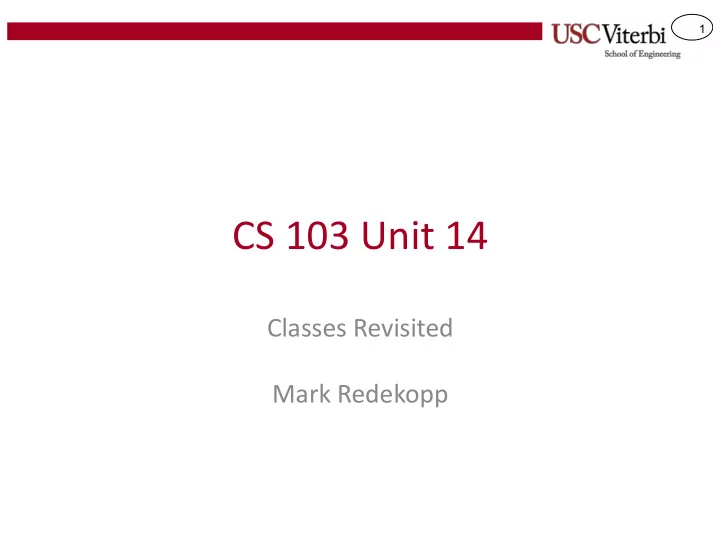

1 CS 103 Unit 14 Classes Revisited Mark Redekopp
2 UML (Unified Modeling Language) • Shows class definitions in a language-agnostic way • Shows class hierarchy (inheritance, etc.) • Each class shown in one box with 3 sections – Class Name, Member functions, then Data members – Precede function/data member with: + (public), - (private), # (protected) – Functions show name with arguments : return type – Data members show name : type class name (e.g. Deck ) class Deck { public: Member functions Deck(); // Constructor ~Deck(); // Destructor + shuffle() : void void shuffle(); + cut() : void + get_top_card() : int void cut(); int get_top_card (); Member data private: int cards[52]; - cards[52] : int int top_index ; - top_index : int };
3 Class Notes #include <iostream> #include <vector> using namespace std; • Remember data class ABC members live on from { public: ABC(); one member function void add_score(int s); int get_score(int loc ); private: vector<int > scores; call to the next and can }; // A change to scores here be accessed within ANY void ABC::add_score(int s){ scores.push_back(s); member function } // would be seen by subsequent // calls to member functions int ABC::get_score(int loc){ return scores[loc]; } int main(){ ABC a; a.add_score(95); a.get_score(0); }
4 Class Design class GradeBook • Class names should be 'nouns' { public: • To decide what objects/classes you computeAverage (); int* getScores() need use { return scores; } private: – Object discovery: Based on the int scores[20]; int _size; requirements of description of the }; problem look for the nouns/object bool GradeBook::computeAverage(){ double sum = 0.0; – Object invention: Objects that simplify for(int i=0; i < _size; i++){ management or help glue together the sum += scores[i]; } primary objects return sum / _size; } • Method/Function names should be 'verbs' int main() { GradeBook gb; int* myscores = gb.getScores(); double sum = 0.0; for(int i=0; i < _size; i++){ sum += myscores[i]; } http://www.cprogramming.com/tutorial/class_design.html ... }
5 Class Design class GradeBook { public: • Keep the computation computeAverage (); int* getScores() where the data is (i.e. in { return scores; } int size() { return _size; } private: the appropriate class int scores[20]; int _size, _tail; member functions) }; bool GradeBook::computeAverage(){ double sum = 0.0; for(int i=0; i < _size; i++){ sum += scores[i]; } return sum / _size; } int main() { GradeBook gb; int* myscores = gb.getScores(); double sum = 0.0; for(int i=0; i < gb.size(); i++){ sum += myscores[i]; } ... }
6 Group Activity • Write the class definitions (and maybe eventually the whole program) for a card game – Form groups of 2 or 3 – Choose BlackJack unless you'd really like to do something else
7 Part 1 • Write out the rules in Word, Google Docs, etc. – Put a box around the nouns… – Circle the action verbs • Use the nouns and verbs to define the classes and member functions at a general level
8 BLACKJACK DISCUSSION
9 Blackjack • Make a blackjack directory under the cs101 folder in your VM • wget http://ee.usc.edu/~redekopp/cs101/blackjack.tar • tar xvf blackjack.tar
Recommend
More recommend